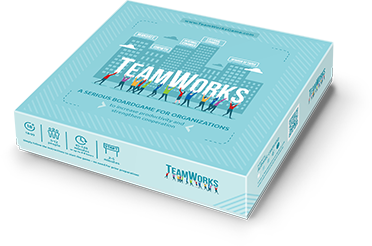How could we create a situation in which
- we can say what we mean,
- important perspectives are brought to the surface,
- we gradually build trust within the team,
- work is done more productively and efficiently,
- a more positive atmosphere is generated?
TeamWorks initiates a new type of discussion within a team to explore what prevents a better execution of their tasks, what could improve clarity in their relations and what could serve their development. TeamWorks is a simple tool that opens up space for sharing opinions, dissolving conflicts and finding solutions.
WE RECOMMEND TEAMWORKS
PRIMARILY FOR A BUSINESS ENVIRONMENT,
FOR LEADERSHIP TEAMS,
WORKING GROUPS,
COLLABORATIVE COMMUNITIES
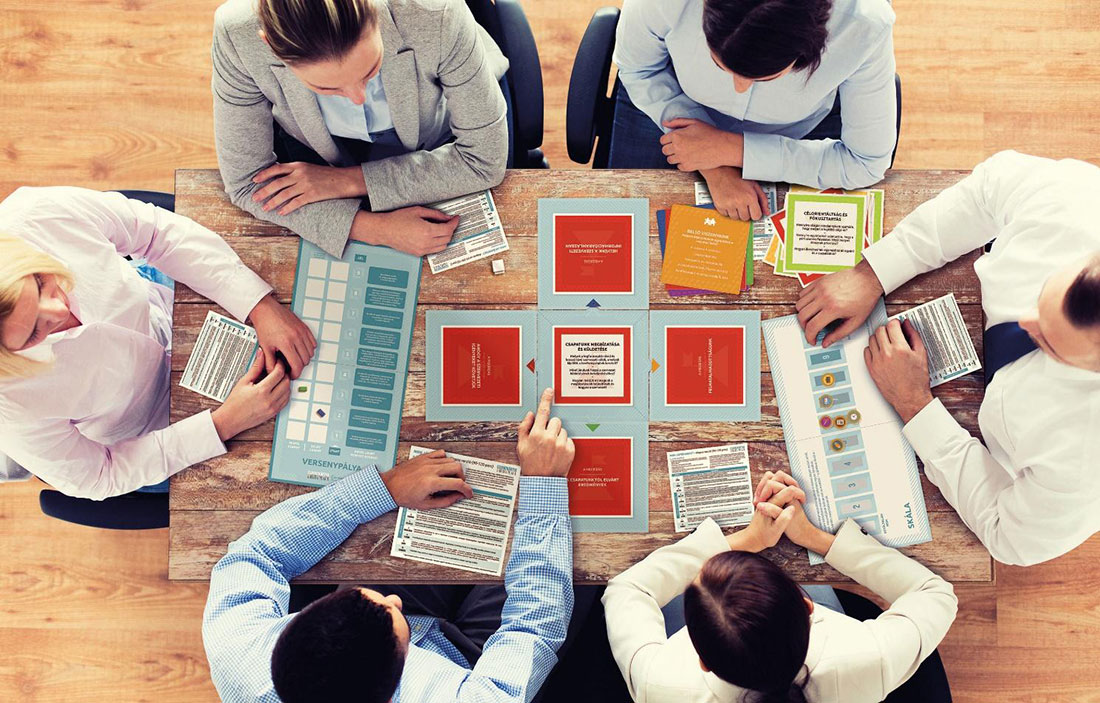
TeamWorks offers support for teams in their
- growth, development and progress from good to great, by honing their ability to examine and understand their situation, operations and relations from new perspectives
- efforts to find solutions for a freshly emerging or long-standing problem or to move on from an impasse, by suggesting ways to support one another creatively in resolving emerging issues
TeamWorks is effective because
- it expands the cognitive perspective of participants
- it offers a structure for possible approaches to assessing a situation and seeking solutions
By the end of the game, the team will come up with constructive suggestions and will specify action items. Cooperation tends to become more effective as the engagement of the participants and the cohesion of the team strengthens and solidifies.
Order the game
The object of the game
TeamWorks promotes effective yet playful discussion among members of a team relating to a topic that the team first selects from 5 main topics, then narrows down to one of 5 subtopics. Exploring aspects of the selected subtopic, 3 open questions will provide a strong focus for the discussion.
Main topics (inspired by Peter Hawkins’s team coaching model):
- Mandate: What expectations do we need to meet?
- External Dynamics: How do we connect with those outside the team?
- Division of Tasks: How are we organized to complete our tasks best?
- Internal Dynamics: How do we connect with one another within the team?
- Opportunities for Growth: How do we learn from our experiences?
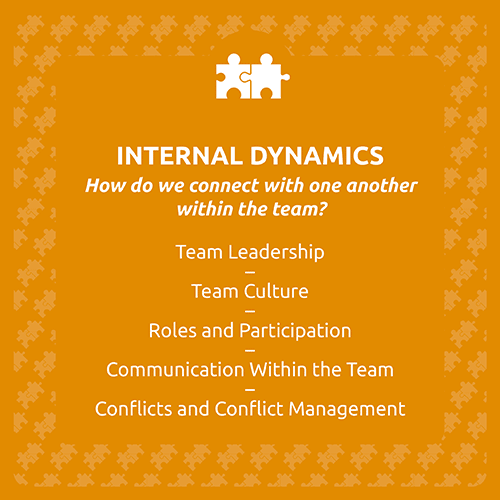 |
Each main topic is explored
further through 5 subtopics.
For example these are the five
subtopics for the main topic
"Internal Dynamics". |
How to play the game?
TeamWorks has several versions you can play, but the basic steps are always the same:
- Assemble the gameboard and arrange the other elements of the game.
- As a team, select the main topic you consider most pertinent for you.
- As a team, decide which subtopic you want to discuss within the main topic.
- One of the participants reads out the 3 questions of the selected subtopic.
- Participants have 2 minutes each to share their answers and comments.
- Offer brief reactions to one another, reflecting on individual opinions voiced.
- Collect suggestions for solutions and prepare a to-do list of the action items you agreed upon.
Additional boardgame elements are included to enhance the fun aspect of the process: a racetrack allows for the team to compete against a reference team, and a scale offers a way to share your opinions in a quantitative manner.
.gif)
Order the game
Why is TeamWorks effective? What makes it work?
TeamWorks offers a synthesis of the following features for supporting collaborative communities and teams in becoming more productive and effective:
- Everybody gets involved. Many of us stay silent at meetings, for various reasons. The selection of a topic for the team and finding answers to the questions involve every participant, supporting a positive attitude towards expressing opinions, taking responsibility and creating an atmosphere of cooperation. As a framework, the game creates an emotional sense of freedom and security where individual perspectives, even reservations, may be expressed.
- The questions are open-ended. As developers, both of us believe in the power of questions. The questions on the cards create multiple frameworks within which participants can voice their opinions. The questions are exploratory in their nature, which allows for the emergence of many different perspectives about the topic in focus.
- Participants are connected, levelling the playing field. Participants select the topic of their discussion together, and everyone has equal say. It is very exciting to find out who considers what aspect of the topic in focus to be important, and this increases the participants’ curiosity about one another. The team’s leader, who is also present, may step out of the spotlight for a while to allow more space for others’ opinions.
- Significant topics emerge. In our experience, teams and organizations most often have nearly all the knowledge necessary for progress. As business coaches, we consider it our task to activate this knowledge. We also often find, however, that topics important for the team tend to surface only with difficulty. TeamWorks creates an atmosphere and provides a focus that facilitates the emergence of significant topics that have so far remained unvoiced.
- The team has effective and productive discussions. The game provides set time frames, clear procedures and structured rounds for a focused discussion, in which all relevant viewpoints may be voiced and which can, in the end, lead to solutions.
- A relaxed and liberated atmosphere is created. The rounds, elements and additional game features invite playfulness and curiosity in participants, which leads to a more relaxed and, at the same time, more open and more honest discussion. This may become the first step towards a more engaged and more robust cooperation.
All this happens without special concentration; TeamWorks quietly works without much spectacle. Like a good team coach, it unobtrusively remains in the background, frames the discussion and sharpens the focus, sometimes provocatively. Meanwhile, the content and direction are provided by the participants themselves.
Suggested versions of the game
Versions A) and B) are recommended for team discussions and office meetings at work. The game can be played without external help or prior preparation. Just follow the instructions.
A) SIMPLE version (for a 45- to 60-minute game)
- Select the main topic.
- Identify the most relevant subtopic of the selected main topic.
- Share observations and personal thoughts, guided by the three questions.
- Offer reflections and reactions.
- Seek suggestions for solutions.
B) EXTENDED version (for a 90- to 120-minute game)
- Select the main topic.
- Identify the most relevant subtopic of the selected main topic.
- Assess the subtopic using the scale.
- Share observations and personal thoughts, guided by the three questions.
- Offer reflections and reactions.
- Seek suggestions for solutions.
- Conclude with retrospective reflections, such as “What was the most promising aspect of our discussion today?”
- Use the racetrack for a playful competition against a reference team.
C) TEAM BUILDING version (4 to 8 hours)
When facing specific organizational or internal operational problems, when having to make strategic decisions or when feeling a need to harmonize cooperation further, the team may decide to allocate a day or two to finding solutions. TeamWorks can provide a great structure for a retreat. Playing the team building version will allow participants to focus on more than one main topic and/or explore additional subtopics over several rounds.
Find out more
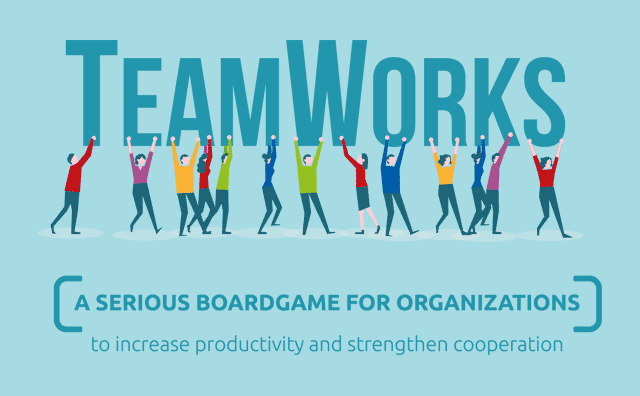
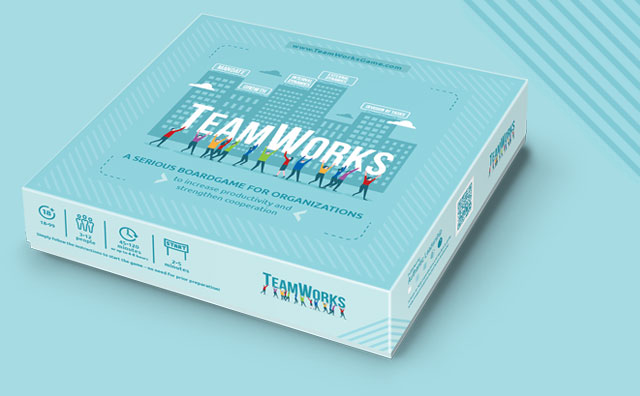



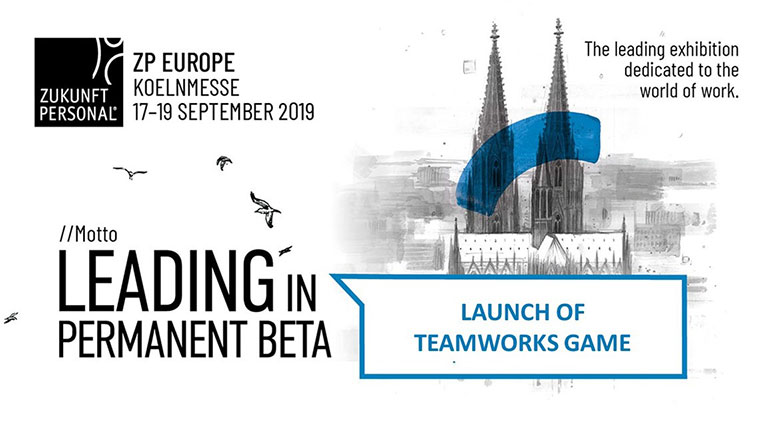
.jpg)

.gif)

